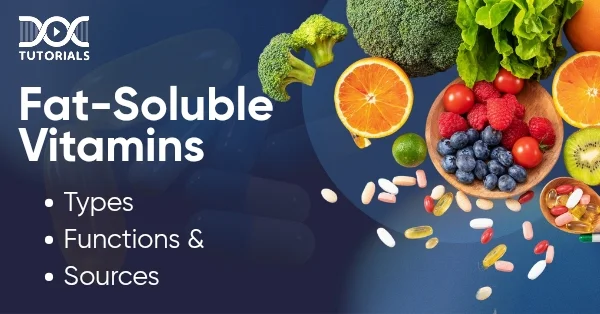Fat-Soluble Vitamins: Types, Functions, and Sources

Fat-soluble vitamins are necessary for healthy growth, development, and bodily function. In contrast to water-soluble vitamins, fat-soluble vitamins dissolve in fats and oils. They are released from the body’s fatty tissues and liver when required or used.
Therefore, they need not be consumed every day. Fat-soluble vitamins can, therefore, impair health if consumed in excess. These vitamins require dietary fats for absorption and play an important role in diet balance.
Read on for information about fat-soluble vitamins, types, functions, sources, and benefits.
What are Fat-Soluble Vitamins?
Fat-soluble vitamins dissolve in fats and oils. The absorption of fat-soluble vitamins occurs in the presence of dietary fats in the digestive tract. After that, fat-soluble vitamins are transported to the fatty tissues and liver, where they are kept until the body needs them. Vitamins A, D, E, and K are fat-soluble vitamins.
Their storage means the body does not need a daily intake of these vitamins. Various fat-containing foods must be consumed to support proper vitamin absorption. These vitamins are required for a range of body functions.
Vitamin A is responsible for vision and immunity; vitamin D protects bone health and immunity; vitamin E is an antioxidant that protects cells; and vitamin K promotes healthy bones and blood coagulation. The body stores fat-soluble vitamins, which means that any excess can create a toxicity risk; thus, it is important to extract these nutrients from foods as much as possible.
What are the Types and Functions of Fat-Soluble Vitamins?
Listed below are the 4 fat-soluble vitamins, their functions, and their importance for health:
- Vitamin A
Vitamin A is an essential component of rhodopsin, the protein found in retinal pigment cells that permits sight in darkness. However, a shortage of this vitamin can cause night blindness or other forms of visual impairment.
Provitamin A, or carotenoids, is found in fruits and vegetables like carrots, sweet potatoes, and leafy greens. Preformed vitamin A, also known as retinol, is found in animal products like liver, eggs, and dairy.
- Vitamin D
Vitamin D is often called the “Sunshine Vitamin” since it is produced in the body when sunlight is absorbed through your skin. Vitamin D is essential for calcium absorption, which is necessary for bone and teeth development and maintenance. Calcium also contributes to muscle movement and immune function.
A vitamin D deficiency causes rickets in children (characterised by weakened, soft bones) and osteomalacia in adults (characterised by bone pain and muscular weakness). Dietary sources of vitamin D include fatty fish such as salmon and mackerel, egg yolks, mushrooms, and fortified foods like milk and cereals.
- Vitamin E
Vitamin E is a significant antioxidant, shielding cell membranes against oxidative stress. Its high free radical content inhibits chronic diseases and promotes cell health. It also aids in immune function and red blood cell production. Leafy greens, nuts, seeds, and vegetable oils are good sources of vitamin E.
- Vitamin K
Vitamin K is principally associated with blood coagulation. It activates proteins required for clotting, thus preventing excess bleeding and aiding in wound repair. Furthermore, vitamin K promotes bone health by enabling the body to synthesise proteins essential for maintaining bone and tissue integrity.
There are 2 significant forms of vitamin K: K1 or phylloquinone, which is found in green leafy vegetables like spinach and kale, and K2 or menaquinones, which occur in fermented foods and certain animal products.
What are the Sources and Benefits of Fat-Soluble Vitamins?
Knowing where to find fat-soluble vitamins and their health benefits helps maintain a balanced diet. Listed below are the sources and the benefits of the vitamins:
Sources
- Vitamin A: Leafy greens, orange and yellow vegetables, milk, eggs, liver, and fish oils.
- Vitamin D: Fatty fish (salmon, mackerel, tuna), fish liver oils, egg yolks, fortified milk, and cereals.
- Vitamin E: Vegetable oils, nuts (almonds, hazelnuts), seeds, spinach, broccoli, fortified cereals.
- Vitamin K: Leafy green vegetables (spinach, kale, broccoli), fermented foods, animal proteins.
Benefits
- Improves Vision: Both immune system function and eyesight depend on vitamin A.
- Boosts Immunity: Vitamin A is critical for the immune system functioning.
- Improved Bone Health: Vitamin D and vitamin K help ensure the strength and health of bones.
- Rich in Antioxidants: Vitamin E protects cells against oxidative injury.
- Helps in Blood Clotting: Vitamin K is necessary for blood clotting and the healing of wounds.
Fat-soluble vitamins can be stored in the body; therefore, they do not need to be consumed daily. However, a varied diet with these vitamins ensures synergistic benefits.
Differences: Fat-Soluble vs. Water-Soluble Vitamins
Vitamins exist in 2 major categories: fat-soluble and water-soluble. The following aspects distinguish them:
| Aspect | Fat-Soluble Vitamins | Water-Soluble Vitamins |
| Solubility | Dissolve in fats/oils | Dissolve in water |
| Storage | Stored in the liver/fatty tissue | Not stored, excess excreted |
| Need for Daily Intake | Not required daily | Required more frequently |
| Examples | A, D, E, K | B-complex, C |
Fat-soluble vitamins interact with dietary fats for absorption and storage, while water-soluble vitamins are dissolved in body fluids and are not stored; they are lost and replenished from the diet regularly.
What Happens Due to the Deficiency and Toxicity of Fat-Soluble Vitamins?
An extensive health issue can arise in case of any deficiency in fat-soluble vitamins, such as:
- Vitamin A Deficiency: Night blindness, lowered immunity, and skin disorders.
- Vitamin D Deficiency: Rickets in children, osteomalacia in adults, weak bones.
- Vitamin E Deficiency: Damage to nerves and muscles, impaired vision.
- Vitamin K Deficiency: Failure to clot blood, profuse bleeding.
Since fat-soluble vitamins are stored in the body, too much consumption, especially in the form of supplementation, can bring on toxicity, as follows:
- Vitamin A toxicity causes nausea, headache, dizziness, and in extreme cases, liver damage.
- Vitamin D toxicity causes increased calcium levels and kidney stones.
- Toxicity to vitamin E increases the risk of bleeding.
- Vitamin K toxicity is rare but can inhibit the effect of blood thinners.
FAQs About Fat-Soluble Vitamins
- What are the four fat-soluble vitamins?
The four main fat-soluble vitamins are A, D, E, and K. These are sometimes confused with others, but the strictly fat-soluble ones are limited to those mentioned.
- What are fat-soluble vs water-soluble vitamins?
Vitamins that dissolve in water are not retained; any excess is eliminated via urine. The body stores fat-soluble vitamins because they dissolve in fat.
- What is a fat-soluble vitamin deficiency?
A deficiency is insufficient fat-soluble vitamins, leading to various signs and symptoms. These include night blindness (vitamin A), weak bones (vitamin D), nerve damage (vitamin E), or blood clotting defects (vitamin K)
- How much vitamin D is needed per day?
The daily vitamin D dosage for most adults is 600-800 IU, yet it may vary according to need; it is advised to consult the healthcare provider for personalised recommendations.
Conclusion
Fat-soluble vitamins, including A, D, E, and K, are important for vision and bone health, immune function, and blood clotting. They are absorbed in association with dietary fats, and deficiencies can have serious repercussions if not addressed.
Understanding fat-soluble vitamins is essential for NEET PG aspirants because it is crucial for biochemistry and clinical nutrition. At DocTutorials, we provide expert-led video lectures, quick revision modules, and high-yield resources to master this topic and excel in their NEET PG preparations.
Check out our NEET PG study materials for better learning!
Latest Blogs
-

INI CET Exam 2025: Your Roadmap to Success – Key Topics, Strategies, and Lessons from Last Year’s Papers
The INI CET exam is more than just a test; it’s a significant milestone for many medical students aiming to…
-

INI CET Exam Success: Previous Year Question Papers & Ultimate Guide – INI CET PYQ
One can feel overwhelmed while preparing for the INI CET (Institute of National Importance Combined Entrance Test). A vast syllabus,…
-

INI CET Exam Pattern 2024: A Complete Guide with Subject-Wise Weightage
The Institute of National Importance Combined Entrance Test (INI CET) is your key to entering some of the most prestigious…




